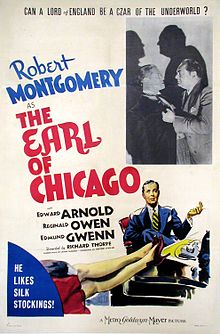| The Earl of Chicago | |
|---|---|
 | |
| Directed by | Richard Thorpe |
| Written by | Lesser Samuels |
| Produced by | Victor Saville |
| Starring | Robert Montgomery, Edward Arnold, Reginald Owen |
| Cinematography | Ray June |
| Edited by | Frank Sullivan |
| Music by | Werner R. Heymann |
| Production company | Metro-Goldwyn-Mayer |
| Distributed by | Loew's Inc. |
| Release date |
|
| Running time | 87 minutes |
| Country | United States |
| Language | English |
The Earl of Chicago is a 1940 American drama film directed by Richard Thorpe and starring Robert Montgomery, Edward Arnold, Reginald Owen and Edmund Gwenn. Made during 1939 and released in January 1940, it was the first MGM film of the 1940s.
Plot
To remedy the ill doings of his past, Robert "Silky" Kilmount, ex-Chicago bootlegger who has opened up his own legal distillery, hires Quentin "Doc" Ramsey as manager of his company. Seven years ago, Silky got Doc sent to prison after framing him for a crime he didn't commit.
Doc has no good intentions when accepting the position, just waiting for an opportunity to take revenge. The window of opportunity arrives with attorney Gervase Gonwell, who comes from England to tell Silky that he has inherited land from his deceased uncle, the Earl of Gorley.
Doc persuades Silky to go to England and visit his new estate, but he insists that Doc go with him. Doc sees the opportunity to ruin Silky and tricks him into signing a formal power of attorney document, giving him the right to do as he pleases while Silky is abroad.
Silky lands upon the English culture and makes quite an impact with his gangster-like behavior among the lords and traditions. He gets help from the kind butler, Munsey, and a cousin, Gerald, and soon finds it in his heart to treasure the ancient traditions and the family history.
Back in the U.S., Doc is emptying the company of every cent without Silky's knowledge. When the ceremony to make him a member of the House of Lords is about to start, he finds out that he is bankrupt and prohibited by law from selling his English estate. Silky kills Doc in anger, and is sentenced to death. He will be hanged by the neck with a silken rope in the Tower of London.
Silky accepts his fate and walks with his head held high, as a true nobleman, to the rope and his death, encouraged by Munsey.
Cast
- Robert Montgomery as Robert Kilmount
- Edward Arnold as Quentin "Doc" Ramsey
- Reginald Owen as Gervase Gonwell
- Edmund Gwenn as Munsey, the butler
- E. E. Clive as Mr. Redwood
- Ronald Sinclair as Master Gerald Kilmount
- Norma Varden as Maureen Kilmount
- Halliwell Hobbes as Lord Chancellor
- Ian Wolfe as Reading Clerk
- Peter Godfrey as Judson
- Paul England as Chief Constable
- Billy Bevan as Castle Guide
- Ted Billings as Townsman (uncredited)
- Olaf Hytten as Hodges (uncredited)
- Miles Mander as Attorney General (uncredited)
- Ben Welden as Driver (uncredited)
References
- "The Earl of Chicago (1940) - Overview - TCM.com". Turner Classic Movies.
External links
| Films directed by Victor Saville | |
|---|---|
|
This 1940s drama film-related article is a stub. You can help Misplaced Pages by expanding it. |
This article related to an American film of the 1940s is a stub. You can help Misplaced Pages by expanding it. |
- 1940 films
- 1940s English-language films
- Films directed by Richard Thorpe
- 1940 drama films
- American drama films
- Films set in London
- Films produced by Victor Saville
- Films with screenplays by Lesser Samuels
- American black-and-white films
- Metro-Goldwyn-Mayer films
- 1940s American films
- English-language drama films
- Films scored by Werner R. Heymann
- 1940s drama film stubs
- 1940s American film stubs